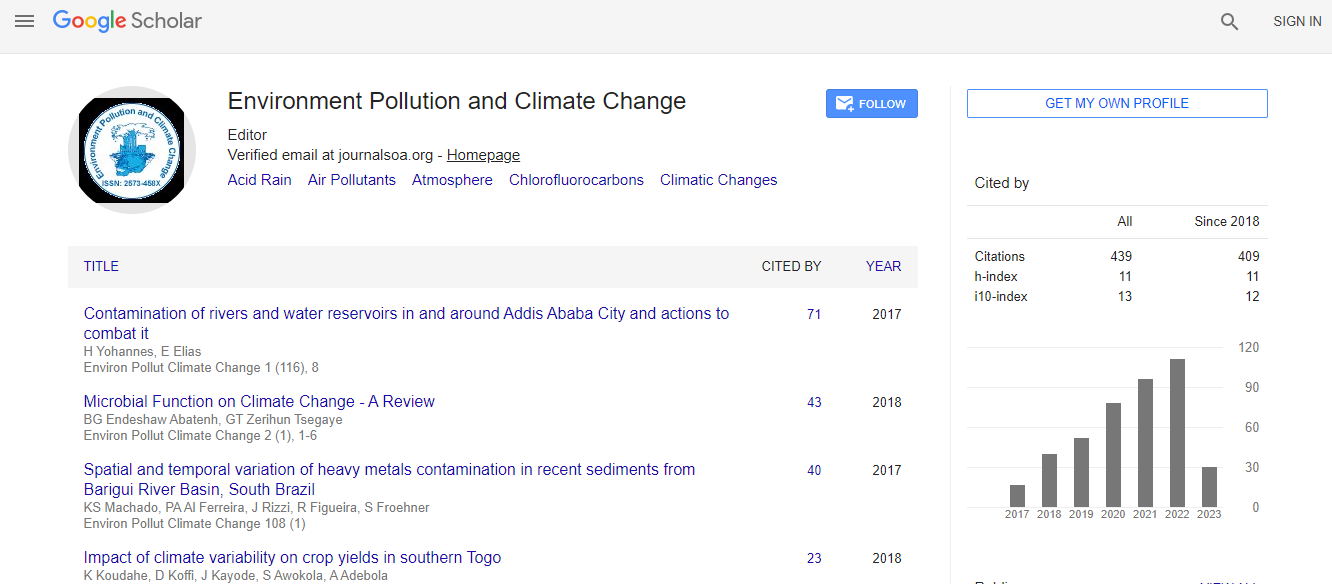Our Group organises 3000+ Global Conferenceseries Events every year across USA, Europe & Asia with support from 1000 more scientific Societies and Publishes 700+ Open Access Journals which contains over 50000 eminent personalities, reputed scientists as editorial board members.
Open Access Journals gaining more Readers and Citations
700 Journals and 15,000,000 Readers Each Journal is getting 25,000+ Readers
Google Scholar citation report
Citations : 672
Environment Pollution and Climate Change received 672 citations as per Google Scholar report
Environment Pollution and Climate Change peer review process verified at publons
Indexed In
- Google Scholar
- Publons
- Euro Pub
- ICMJE
Useful Links
Recommended Journals
Share This Page
Exploring perceptions of local stakeholders on climate change adaptation in Central and Western Terai, Nepal
Joint Event on 5th World Conference on Climate Change & 16th Annual Meeting on Environmental Toxicology and Biological Systems
Shree Kumar Maharjan and Keshav Lall Maharjan
Hiroshima University, Japan
ScientificTracks Abstracts: Environ Pollut Climate Change
Abstract
Climate change has varied impacts on diverse livelihood sectors, which is more prominent at the community level. The stakeholders and local institutions have been supporting the communities either by building adaptive capacities and climate resilience or minimizing the impacts through different adaptation interventions. Some of these interventions are effective, whereas others need further dynamics and exertions considering the complexity of the climate risks and vulnerabilities. Hence, consolidated efforts of concerned stakeholders are required to minimize the present and future climate impacts. This study digs out and analyzes the perceptions of local stakeholders on climate change adaptation in Madi and Deukhuri valleys of Nepal through a questionnaire survey. These local stakeholders revealed flood, drought, cold wave and riverbank erosion as the major climatic risks and hazards found in the sites eventually impacting on the loss of agricultural production, loss of agricultural land and properties, loss of livestock, the emergence of diseases and pest. The stakeholders believed that most of the farmers dealing with these impacts were based on their traditional knowledge and practices, followed by with the support of NGOs and with the help of neighbors and community. The major supports of the stakeholders to deal with these impacts are on training and awareness, risk analysis and minimization, livelihood improvement, financial support, coordination and networking and facilitation in policy formulation. The stakeholders perceived that capacity building, appropriate technologies, communitybased planning, prioritization of poor and marginalized, community fund and community-based monitoring, and evaluation were the most important supports required for the community, respectively. Recent Publications 1. Maharjan S K and Maharjan K L (2018) Roles and contributions of community seed banks in climate adaptation in Nepal. Development in Practice 28(2):292–302. 2. Maharjan S K (2017) Riverbed farming as source of income, family nutrition and food security for landless and poor farmers in Terai region of Nepal. Scientia Recerca: innovative Techniques in Agriculture 2(1):316–319. 3. Maharjan S K and Maharjan K L (2017) Indigenous peoples, indigenous knowledge and issues of indigenous peoples on climate change particularly REDD+ in developing countries. International Journal of Applied Sciences and Biotechnology 5(3):272–283. 4. Maharjan S K and Maharjan K L (2017) State of climate policies, plans/strategies and factors affecting its implementation in Nepal. International Journal of Conservation Science 8(3):485-496. 5. Maharjan S K, Maharjan K L, Tiwari U and Sen N P (2017) Participatory vulnerability assessment of climate change vulnerabilities and impacts in Madi Valley of Chitwan district, Nepal. Cogent Food and Agriculture 3(1).Biography
Shree Kumar Maharjan is currently pursuing his PhD at the Graduate School of International Development and Cooperation, Hiroshima University, Japan. He has been studying and researching on the issues of climate change adaptation in agriculture, indigenous peoples’ rights, participatory approaches, community-based biodiversity management for almost a decade. He has published more than dozens of papers on these issues. His publication H-index is 3.
E-mail: smilingsiri@gmail.com

 Spanish
Spanish  Chinese
Chinese  Russian
Russian  German
German  French
French  Japanese
Japanese  Portuguese
Portuguese  Hindi
Hindi 
